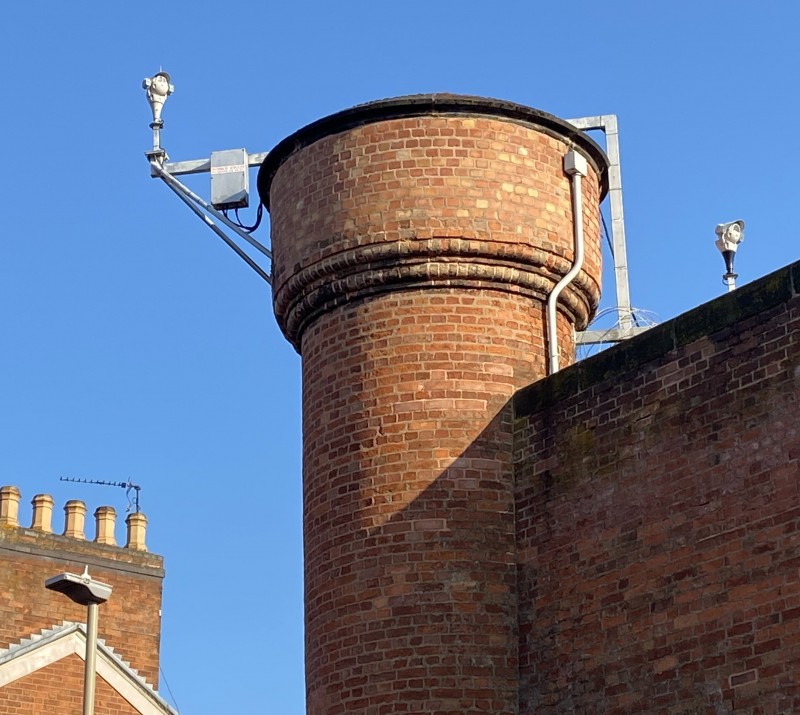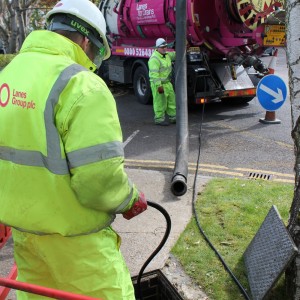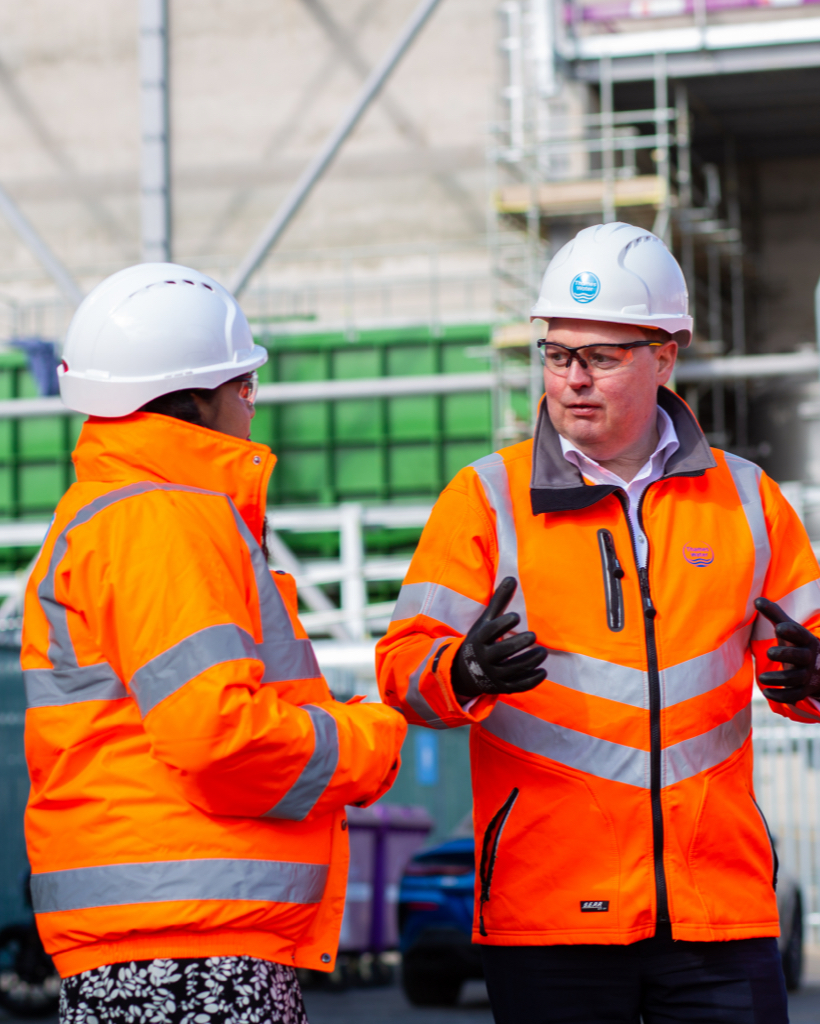7 essentials for delivering drainage services in prisons

Drainage engineers from Lanes Group plc work in some of the most unusual and challenging environments imaginable, from giant public sewers and nuclear power stations to rail tunnels under the sea.
Perhaps the most challenging of them all can be working in prisons. Lanes drainage teams have worked on drains and sewers in dozens of prisons across the UK.
The unique nature of prison environments often requires a different approach to drainage work, as well as specific skills and qualities for it to be completed safely and effectively.
Here are seven essential elements that must be in place for working on drainage systems in prisons, so they remain fit for purpose.
Planning
All drainage works needs planning to ensure the resources required are in place, even for emergency drain unblocking. However, the security issues related to prisons require a much more detailed and planned response.
All external workers need to be security checked before they can enter prisons. This requires Lanes business support teams to submit documentation in a timely way, so the prison service has the information it needs for its vetting procedure.
Warren Lewis, an Area Development Manager at the Lanes Birmingham depot, said: “Getting operatives security checked to work in prisons can be a lengthy and difficult process, before work has even started.
“As Lanes is a national specialist, with a workforce and resources to match, this is not such a problem, and our experience stands us in good stead when working at different types of prison establishments.”
Resources
Alongside security planning, there is the need to mobilise resources and commit them to projects. Once teams and vehicles are inside the prison area, they cannot come and go as they can with other work.
Because all personnel must be security checked, having all the skills and equipment that may be needed to hand, is also vital. There is little scope for sub-contracting work to other companies at short notice.
Warren Lewis again: “Contractors must have the right specialist drainage vehicles plus equipment and teams with the right mix of skills in place. As the UK’s largest independent wastewater and drainage specialist, that is not an issue for Lanes.”
For example, Lanes operates one of the UK’s largest fleets of recycler jet vac tankers. These can filter and reuse their water, allowing them to stay on station working for longer, which is certainly helpful when it is not easily possible to leave site to dispose of waste, or move location to refill the water tank.
Lanes also has one of the most modern fleets of CCTV drainage survey vans. They have the latest software systems that allow data to be transferred from work sites via the cloud to a national survey processing unit, speeding up the survey reporting process.
Repairing internal drainage systems, such as wastewater stacks, can be a real challenge in prisons. However, Lanes has a new vertical pipe lining system that makes rehabilitating downpipes much quicker and easier.

Leadership
Once a work team is inside a prison, there is little scope to communicate with colleagues outside, and even less chance to ask for additional resources.
This is why the work team manager needs to be highly experienced and able to lead his or her colleagues effectively in a complex environment.
For example, what may be a simple task in other environments may be very difficult, if not impossible inside a prison.
Chris Norbury, Area Development Manager at Lanes Derby, explains: “If access to a pipe is a problem in one location, it’s often possible to access it from another chamber a few metres away.
“In a prison, because of security issues, that may not be possible. Our teams working in prisons need to be great problem solvers, and having good leadership is a great help.”
Knowledge
This approach goes hand-in-hand with the need to have excellent knowledge of different drainage systems, literally through the ages.
Older prisons have often been built, redeveloped, refurbished and repaired over decades, to different standards, using different materials. This applies to drainage systems just as much as other built structures.
Also, most drains and sewers are hidden assets. In prisons, they are located in highly-controlled spaces. Therefore, having the skill and experience to diagnose problems, when options for detailed investigations may be limited, is a major plus.
Kyle Burgess, Area Development Manager at Lanes Cardiff, said: “Drainage work is all about solving hidden puzzles. Working in prisons, heightens that process.
“In one location, the drains could be hundreds of years old. A few metres away, they could be brand new. Understanding how these systems can work together most effectively is essential.”
Partnership
None of the Lanes teams working in prisons across the UK can do so without close cooperation with the prison maintenance and security teams. All security procedures need to be followed to the letter.
In higher category prisons, facilities management personnel have their own security guards who look after visiting work teams, so prison officers can focus on managing inmates.
This means building a strong relationship with client teams, based on trust and agreed purpose, is essential. When on site, working closely with client colleagues, and understanding their priorities is essential.
Also, different types of prisons and secure units, operate different rules. The experience Lanes has of working across these establishments, from open prisons to maximum security prisons, helps its teams deliver services more efficiently.
David Beveridge, Lanes Regional Development Manager in Scotland, said: “Our partnership approach starts at the planning stage. Having the experience needed to foresee problems caused by operating in secure environments, and working with clients to deal with them, is essential.”

Patience
Nothing can happen quickly in prisons. Think of all the doors that need to be unlocked and locked just to get around. The need for security, and to protect the welfare of prisoners and prison officers, takes priority over surveying or cleaning drains.
For Lanes drainage engineers, this means a task that may take an hour to complete outside the prison walls, may take half a day behind them. Good planning and smart working count for a lot, but so does the need for patience, and perseverance.
Respect
Working in prisons can be stressful for external contractors. The demands placed on Lanes drainage engineers by overcoming all the practical challenges described already are quite enough.
But they are also working in an environment that places them very close to many people who have committed crimes, many of them identified as being highly dangerous.
Lanes understands this, and so always seeks to understand the possible impact it has on the wellbeing of its teams, says Lanes Birmingham ADM Warren Lewis.
“Prisons are very challenging and alien environments,” he added. “The feeling of being locked inside, even as a visiting worker, is not pleasant for some.
“Though our client colleagues take all steps needed to create safe spaces to work in, the sights, sounds and feelings created by being in a prison can make some people feel anxious.
“That’s why, if some colleagues don’t want to be deployed on these projects, we respect their feelings. On a recent big project in a Category B prison, we’ve been rotating our work teams, so they also get to work in less challenging environments.
“As a large drainage contractor, this is something we can do for our teams. For other companies, it may be less of a priority, or they may not have the capacity to do it.”
Prisons, by definition, are challenging to work in. They can also put great strains on their drainage systems – in terms of the intensity of the building use, and the way pipe systems in many prisons have been developed over time.
Lanes has developed essential expertise, know-how and resources to counter these challenges, so wastewater and drainage services can be delivered in a timely, safe, sustainable, and cost-effective way.
Find out more
Talk to Lanes today about drainage services for prisons and other secure units. Call 0800 526 488.
Email: sales@lanesgroup.co.uk.







